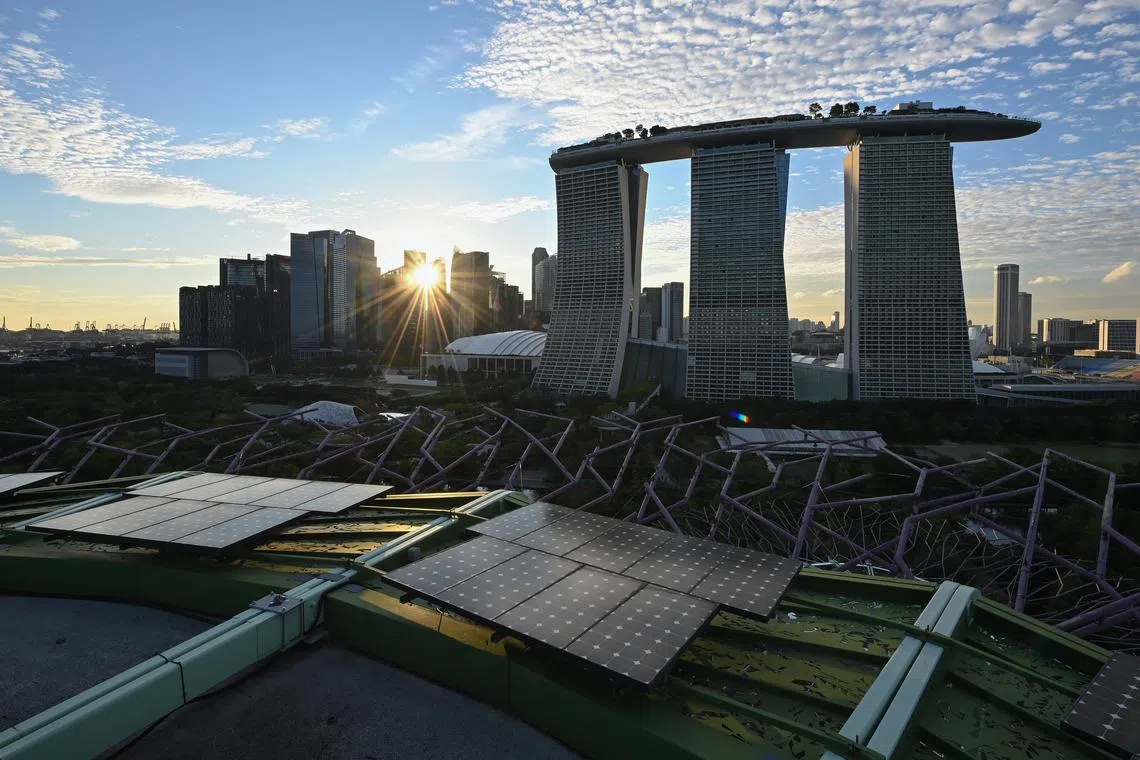Only 15% of people surveyed are aware of S’pore’s net-zero emission target: Study
Sign up now: Get ST's newsletters delivered to your inbox

Singapore’s total emissions for 2021 – the latest data available – was 53.7 million tonnes.
PHOTO: ST FILE
Follow topic:
SINGAPORE – A nationwide survey has found that only 15 per cent of respondents were aware of Singapore’s target of getting to net-zero carbon emissions by 2050, but nearly two-thirds expressed strong interest to contribute when informed about the goal.
More than half of the respondents were already taking climate-friendly actions, such as setting the air-conditioner temperature to at least 25 deg C, and cutting back on single-use plastics. But many were resistant towards changes that require more effort, like eating less meat and reducing air travel.
The study was done in 2023 among some 2,300 people aged 15 and above to understand their attitudes towards Singapore’s net-zero target and its associated policies, as well as the actions they intended to take to support the target.
It was conducted by Lloyd’s Register Foundation Institute for the Public Understanding of Risk (Ipur) at NUS, the Lee Kuan Yew Centre for Innovative Cities at SUTD, and the Environmental Behavioural Sciences and Economics Research Unit of the Ministry of Sustainability and the Environment.
Singapore’s total emissions for 2021 – the latest data available – was 53.7 million tonnes, with the key contributing sectors being industry (44.4 per cent), power (39.2 per cent) and transport (14.2 per cent).
Government chief sustainability officer Lim Tuang Liang said: “Every individual plays a pivotal role in propelling Singapore towards our national net-zero goal, which complements the efforts of both government and businesses.”
The survey results, which were made public on May 15, showed that some 65 per cent of respondents supported the Republic’s net-zero target when given more information about it, with another 17 per cent hoping for a more ambitious timeline to get to net zero.
The respondents were also asked how supportive they were of 12 government policies, ranging from transport to energy, which would help get Singapore to its goal.
Around 60 per cent were supportive of all 12 policies, with the most popular ones being planting more trees, building more parks, enhancing solar deployment and expanding the MRT/LRT network.
These policies involve government expenditure and have no direct additional costs for households, the report noted.
Other policies received less support. For instance, more than 20 per cent of the respondents were undecided about their backing for the phasing out of petrol or diesel vehicles and increasing the carbon tax for businesses, though over 60 per cent supported these moves.
The carbon tax was raised to $25 per tonne of emissions from 2024, up from $5 per tonne, and will eventually reach between $50 and $80 per tonne by 2030.
As for a disposable bag charge imposed in July 2023,
Large supermarket operators are required to charge at least five cents per plastic bag,
The respondents were also shown 13 climate-friendly actions they could take as individuals and asked which actions were most effective in helping to cut Singapore’s emissions. They perceived taking public transport, reducing single-use plastics and recycling as much as possible to have the highest impact on carbon emissions.
Eight of the 13 climate-friendly actions – such as setting air-conditioner temperature to at least 25 deg C, and tapping less single-use plastics – were already practised by more than half of the respondents, as they perceived these actions to incur low additional cost or require little effort.
While some international studies found that switching to a plant-based diet, reducing air travel or cutting food waste were among the most impactful ways of cutting emissions, there is no Singapore-specific data on the effectiveness of a comprehensive set of individual actions that could substantially impact emissions here.
Taking into consideration the Republic’s unique set of circumstances will be important, the report noted. For instance, the country imports more than 90 per cent of its food. This means that the type of transportation used to import food and the distance travelled to Singapore will add to its carbon footprint.
A 2019 study showed that while red meat like beef is known to be very carbon-intensive, Singaporeans consumed very little of it. Instead, pork was the largest contributor to Singapore’s food-related emissions.
Making high-effort lifestyle changes to reduce the personal carbon footprint included reducing one’s meat consumption and frequency of air travel. However, the key barriers were reluctance to change habits, inconvenience and a perception that alterations to one’s food consumption would not have an impact on the Republic’s emissions, said the report.
Respondents aged 55 and above had stronger intentions than the younger group to make both low- and high-effort lifestyle changes, such as flying less frequently, and taking more everyday actions, such as reducing air-conditioner use.
Dr Olivia Jensen, deputy director of Ipur and an author of the report, said: “The study demonstrated that Singaporeans are keen to get more information about how to reduce their carbon footprint. Now, the research community needs to strengthen the evidence base around personal carbon emissions of Singapore residents to make sure that the guidance given to people is grounded in science.”
She added: “We also need to design ways of conveying climate information effectively without overwhelming people or undermining their will to act.”


